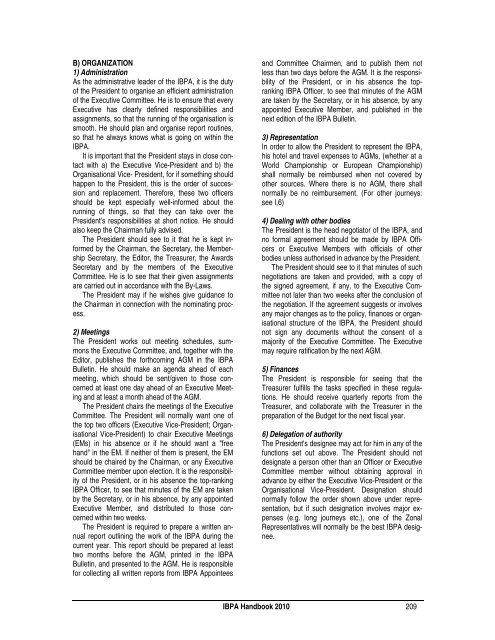Handbook - International Bridge Press Association
Handbook - International Bridge Press Association
Handbook - International Bridge Press Association
You also want an ePaper? Increase the reach of your titles
YUMPU automatically turns print PDFs into web optimized ePapers that Google loves.
B) ORGANIZATION<br />
1) Administration<br />
As the administrative leader of the IBPA, it is the duty<br />
of the President to organise an efficient administration<br />
of the Executive Committee. He is to ensure that every<br />
Executive has clearly defined responsibilities and<br />
assignments, so that the running of the organisation is<br />
smooth. He should plan and organise report routines,<br />
so that he always knows what is going on within the<br />
IBPA.<br />
It is important that the President stays in close contact<br />
with a) the Executive Vice-President and b) the<br />
Organisational Vice- President, for if something should<br />
happen to the President, this is the order of succession<br />
and replacement. Therefore, these two officers<br />
should be kept especially well-informed about the<br />
running of things, so that they can take over the<br />
President's responsibilities at short notice. He should<br />
also keep the Chairman fully advised.<br />
The President should see to it that he is kept informed<br />
by the Chairman, the Secretary, the Membership<br />
Secretary, the Editor, the Treasurer, the Awards<br />
Secretary and by the members of the Executive<br />
Committee. He is to see that their given assignments<br />
are carried out in accordance with the By-Laws.<br />
The President may if he wishes give guidance to<br />
the Chairman in connection with the nominating process.<br />
2) Meetings<br />
The President works out meeting schedules, summons<br />
the Executive Committee, and, together with the<br />
Editor, publishes the forthcoming AGM in the IBPA<br />
Bulletin. He should make an agenda ahead of each<br />
meeting, which should be sent/given to those concerned<br />
at least one day ahead of an Executive Meeting<br />
and at least a month ahead of the AGM.<br />
The President chairs the meetings of the Executive<br />
Committee. The President will normally want one of<br />
the top two officers (Executive Vice-President; Organisational<br />
Vice-President) to chair Executive Meetings<br />
(EMs) in his absence or if he should want a "free<br />
hand" in the EM. If neither of them is present, the EM<br />
should be chaired by the Chairman, or any Executive<br />
Committee member upon election. It is the responsibility<br />
of the President, or in his absence the top-ranking<br />
IBPA Officer, to see that minutes of the EM are taken<br />
by the Secretary, or in his absence, by any appointed<br />
Executive Member, and distributed to those concerned<br />
within two weeks.<br />
The President is required to prepare a written annual<br />
report outlining the work of the IBPA during the<br />
current year. This report should be prepared at least<br />
two months before the AGM, printed in the IBPA<br />
Bulletin, and presented to the AGM. He is responsible<br />
for collecting all written reports from IBPA Appointees<br />
and Committee Chairmen, and to publish them not<br />
less than two days before the AGM. It is the responsibility<br />
of the President, or in his absence the topranking<br />
IBPA Officer, to see that minutes of the AGM<br />
are taken by the Secretary, or in his absence, by any<br />
appointed Executive Member, and published in the<br />
next edition of the IBPA Bulletin.<br />
3) Representation<br />
In order to allow the President to represent the IBPA,<br />
his hotel and travel expenses to AGMs, (whether at a<br />
World Championship or European Championship)<br />
shall normally be reimbursed when not covered by<br />
other sources. Where there is no AGM, there shall<br />
normally be no reimbursement. (For other journeys:<br />
see I,6)<br />
4) Dealing with other bodies<br />
The President is the head negotiator of the IBPA, and<br />
no formal agreement should be made by IBPA Officers<br />
or Executive Members with officials of other<br />
bodies unless authorised in advance by the President.<br />
The President should see to it that minutes of such<br />
negotiations are taken and provided, with a copy of<br />
the signed agreement, if any, to the Executive Committee<br />
not later than two weeks after the conclusion of<br />
the negotiation. If the agreement suggests or involves<br />
any major changes as to the policy, finances or organisational<br />
structure of the IBPA, the President should<br />
not sign any documents without the consent of a<br />
majority of the Executive Committee. The Executive<br />
may require ratification by the next AGM.<br />
5) Finances<br />
The President is responsible for seeing that the<br />
Treasurer fulfills the tasks specified in these regulations.<br />
He should receive quarterly reports from the<br />
Treasurer, and collaborate with the Treasurer in the<br />
preparation of the Budget for the next fiscal year.<br />
6) Delegation of authority<br />
The President's designee may act for him in any of the<br />
functions set out above. The President should not<br />
designate a person other than an Officer or Executive<br />
Committee member without obtaining approval in<br />
advance by either the Executive Vice-President or the<br />
Organisational Vice-President. Designation should<br />
normally follow the order shown above under representation,<br />
but if such designation involves major expenses<br />
(e.g. long journeys etc.), one of the Zonal<br />
Representatives will normally be the best IBPA designee.<br />
IBPA <strong>Handbook</strong> 2010 209


